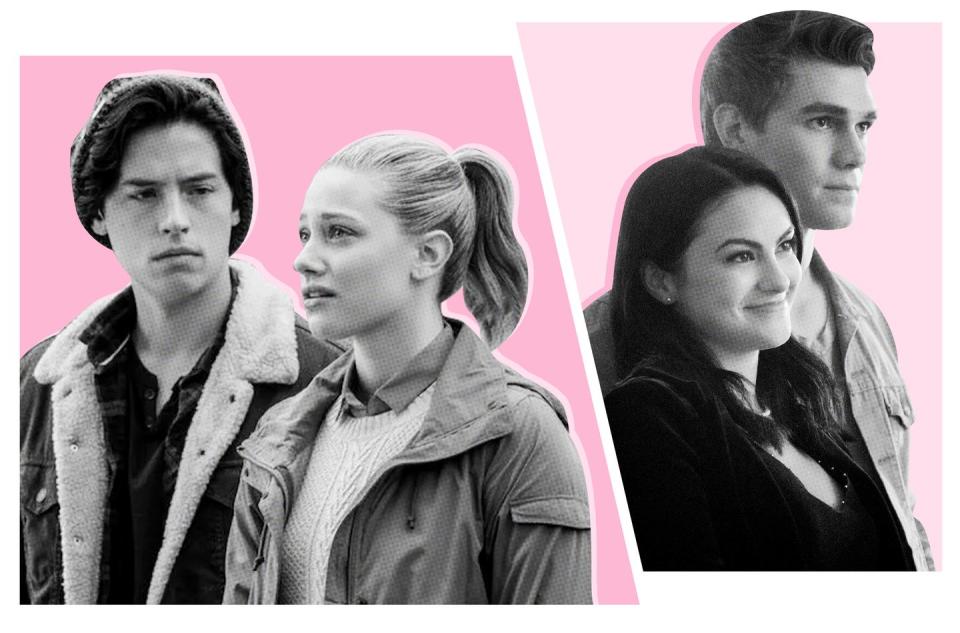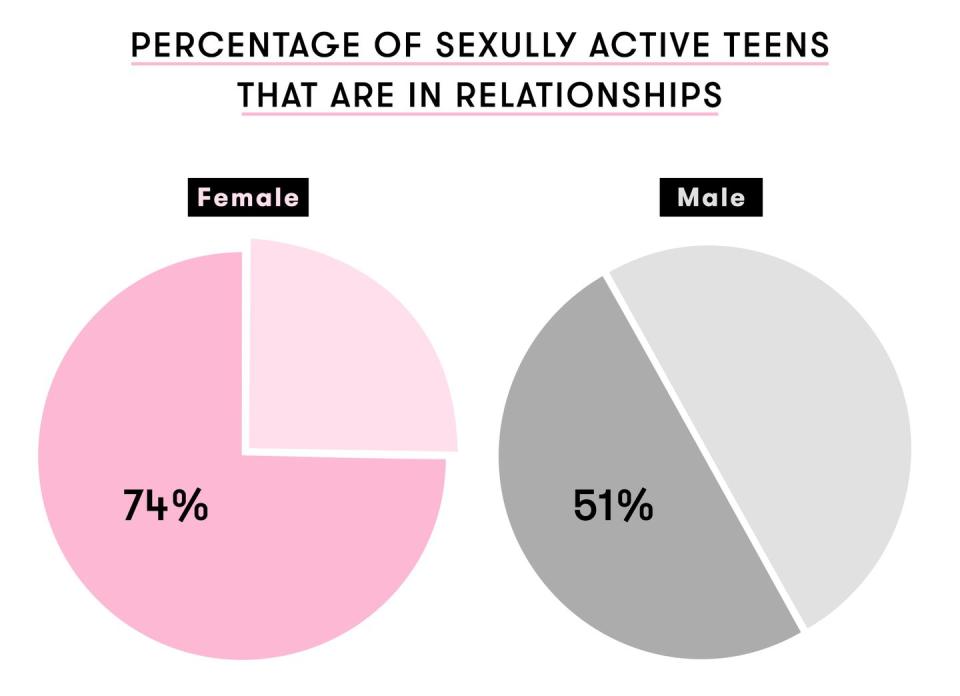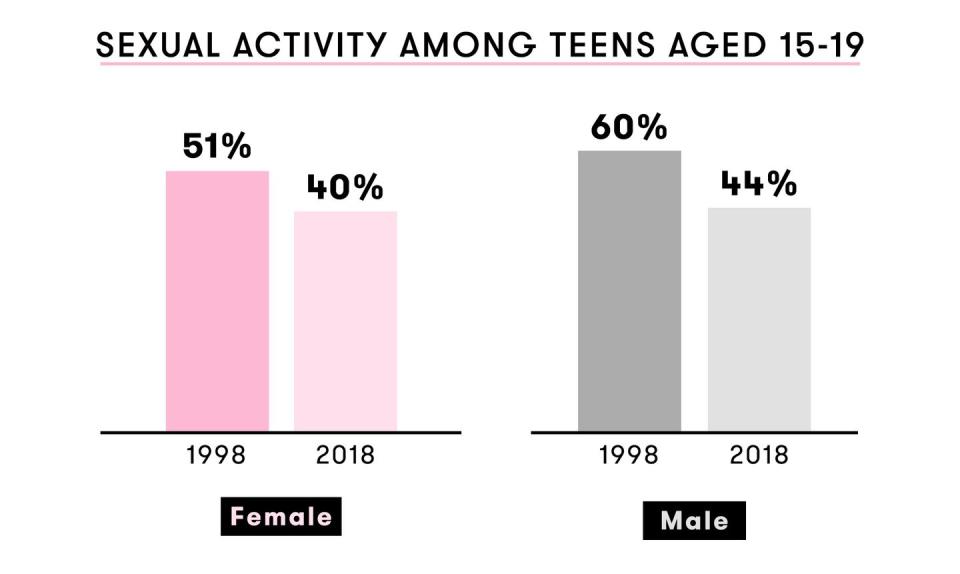Are Teenagers Having As Much Sex as "Riverdale" Thinks They Are?


Madelyn Clemmons took a seat on her couch, dinner in hand, after a long day of school. She planned the timing perfectly, and she was ready to enjoy her meal with a side of the Riverdale season two premiere right as it aired.
The episode started off fairly typical. Fred Andrews was fighting for his life after being shot by the Black Hood in the previous season's finale and Jughead was trying to find out who pulled the trigger. Then, Madelyn's perfectly timed evening fell apart, because just as Veronica stepped in the shower to join her boyfriend, Archie, Madelyn's parents stepped through the front door.
They couldn't see the screen immediately, but Madelyn didn't want to risk it. Despite the fact that the show was live, she turned off the TV, deciding instead to catch the rest of the episode when it was posted online. "For everyone's comfort," she later said.
Madelyn was 17 at the time, the appropriate age for a series geared towards teenagers. Why, then, did she feel the need to turn off the show as her parents walked in? Would they be upset that their daughter was watching something with mature content? Not necessarily. "I guess my thought process was stemming from embarrassment due to the fact that I don’t want my parents to assume that just because those characters are around my age, I’m involved in that."
Madelyn's conundrum brings up an interesting question. Riverdale portrays teens from ages 14-18 engaging in sexual acts. In fact, it's rare to find a character on the show who hasn't had their moment in the sexual spotlight. But are real teens of the same age having sex at the rate that the CW show suggests? And, what affect could this depiction of teens have on the series' audience?

To provide some background, Riverdale pulls its characters from the iconic Archie Comics. In this modern retelling, however, Archie and his friends are more preoccupied with serial killers than who they should take to prom. That being said, there is still a lot of time for relationships on the show, and almost every major character finds him or herself in one. And with each relationship, undoubtedly comes sex, more so for some than others.
Take Veronica Lodge and Archie Andrews (or Varchie as the fans call them), one of the central relationships on the show. They begin dating in the finale of the first season, and they seal the deal, so to speak, later in that same episode. After that, their relationship is largely defined by the couple's high libido, which leads them to enjoy some time in the shower together as Archie's dad lays in a hospital bed recovering from a bullet wound.
"With Archie and Veronica, I feel like having sex is really all they do," said Jessica, a 20-year-old fan of the show. "Their entire relationship is pretty much just sex and I think the show calls it out in their own way." She's right, the show does poke fun at Varchie's tendency to jump right into bed. It often depicts their sex with squeaking beds and wall shaking, once causing those in the room over to ask,"is that their response to everything? Can't they ever just have a conversation?"
And then there's the other main couple in the show, Betty and Jughead (Bughead), a foil to Varchie in many ways, though not necessarily when it comes to intercourse. While it takes the couple a little longer to have sex for the first time, it's not without lack of trying (the two attempt to do so in the season one finale, the same time Varchie does the deed, but they are interrupted).
Still, there is something missing in Bughead's first attempted sexual encounter. Anyone who knows the show (or the comics for that matter), knows Betty as more of the good girl, to Veronica's riskier attitude. Because of this, her character is perfectly set to have that classic conversation with Jughead, or a friend, about waiting until she's ready, using protection, or being worried about pregnancy, but those conversations never occur.

In fact, they are almost completely absent in this show featuring teens and sex. At one point, Betty's mother warns her daughter that if "that beanie wearing cad defiled you, at least please tell me that you were safe," referring to Jughead's choice of hat wear. And with that, you get the only mention of contraception in the entirety of the show.
For sex and relationship therapist Megan Fleming, this is problematic. "These shows, and porn, are shaping teens minds about the ideas of pleasure, power, and intimacy," she said. "So for me, it's important to consider how sex is being portrayed. It's a disservice that they're not talking about STDs and safe sex practices."
Megan does, however, feel that some parts of Riverdale's sexual narrative are actually extremely accurate. "The majority of teens that are having sex are doing so in committed relationships," she explains. "So that's about 74% of sexually active females and 51% of sexually active males." The fact that most of the sex is almost exclusively occurring between couples on the show is representative of the real world, but since pretty much every couple in Riverdale is engaging in sexual intercourse, the accuracy ends there.

"In regards to the idea that all the couples are having sex, they're not being accurate because it's only about 50% of teen couples that engage in sexual intercourse," Megan said. In fact, that percentage has decreased considerably in the past twenty years. According to Megan, while in 1998, 51% of girls and 60% of boys between the ages of 15 and 19 were sexually active, the numbers have dropped to 40% and 44%, respectively.
So, to be more representative of teens these days, Megan suggests that the show portray other couples that are simply "dating, kissing, making out, or groping" because "not all teenagers in a committed relationship are having sex."

Of course, watching Riverdale you wouldn't know that. In any given episode you can see up to four or five couples engaging in sexual acts, sometimes all at the same time.
So, why does all of this matter? It's just a show after all, right? While some think they aren't affected by what they see on their screens, others, like 16-year-old fan Jade, admit they understand the issue when it comes to Riverdale's portrayal of sex. "The media influences us a lot and teenagers just kind of go along with that the media says," she said.
Many studies, including one from the Western Journal of Medicine, have been conducted that back up Jade's assumption, finding that "viewing sexual content can have moderate effects on sexual knowledge and attitude." Another study published in The Journal of Sex Research found that those who used media as "primary models of sexual responsibility" are "less likely to use contraception."
That being said, television has also been proven to be a useful tool for educating teens about safe sex. In a 2003 episode of Friends, Rachel and Ross find out they're pregnant, despite using a condom, which shocks Ross who wasn't aware that the contraception isn't 100% effective at preventing pregnancy. A study following the airing of this episode found that 1.67 million people between the ages 0f 12 and 17 tuned in to watch it. Of that group, 65% confirmed recalling the show's information about condom-effectiveness and 10% of the viewers engaged in conversations with an adult about contraception as a result.
Not only did that episode of Friends portray a possible consequence of sex, but it sparked conversation about sexual health among the show's young audience. The more often we can facilitate conversations like these, the better, because sometimes, it can be hard to make the right decision in the heat of the moment. Studies show that the adolescent brain is significantly different than an adult brain in that the frontal cortex is still developing. It just so happens that's the area of the brain used in decision making, according to the American Academy of Child & Adolescent Psychiatry, which is why you might witness your friends and classmates make some questionable choices as you move through middle school, high school and even college.
So while, you may know that it's imperative to use protection in order to avoid the unwanted consequences of sex (like unplanned pregnancy, STDS, etc.), in the moment, when you're getting hot and heavy, you may decide to forget the condom.
That's why it's so important that a show that captures the attention of teens portray protection being used. According to Vulture, the ratings for Riverdale's season two premiere in 2017 tied or beat every show that same night ABC, CBS, or NBS among millennial and Gen-Z viewers. Now, that's a lot of people.

And for many of these adolescents, Riverdale may be their only form of sexual education, says Megan. According to the Guttmacher Institute, the proportion of teens who received formal sexual education between the time periods of 2006-2010 and 2011-2013 declined fairly significantly. While in the first time period, 70% of females and 61% of males were getting instruction about methods of birth control, by 2011-2013, those numbers decreased to 60% and 55%, respectively.
Of course, a lot has changed since 2013 and as of 2016, 24 states and the District of Columbia require public schools to teach sex ed, while 33 states and D.C. require instruction about HIV/AIDs. Still, that's far from the whole country, and many students continue to enter the world of sex without the necessary knowledge.
Sexual education is more important now than ever. It seems like everyday there's a new law like the one recently passed in Alabama, which bans abortion at ever stage of pregnancy, with no exception for cases of rape or incest. While women need to continue the fight for their right to end a pregnancy, they must also educate themselves for the scary chance of a future where that right doesn't exist.
I get it, Riverdale is a teen drama about killer board games and wrestling red heads. Is it really on the writers to portray safe sex? Yes, the show is more a mystery than a case study in teen relationships, but when you depict teens having sex and when your audience is young, the responsibility is there, and Riverdale’s blatant choice to ignore that responsibility is an interesting one.
It's not like other shows of a similar ilk have thwarted the responsibility quite like Riverdale. Take Glee, another iconic teen show. Watching it through, one will find many instances of teens grappling with the decision to have sex. In just one episode we watch Rachel admit to her boyfriend, Jesse, that she is "truly not ready to do this," while Cory regrets his first time. Not to mention, there is also Quinn's unwanted pregnancy.
Glee is a slightly complicated example because it's is also a comedy, and many times awkward sex can be used as comedic relief, but for a drama like Riverdale, perfect, romantic moments are usually what the writers go for. That's not to say that there aren't teen dramas that handle sex with a responsible eye, however.
Dawson's Creek, the popular teen drama from the late 90s starring James Van Der Beek, Katie Holmes, and Michelle Williams, handled teen sex responsibly in its six season run. Throughout the show there are many instances with the characters, who start out in high school, as they explore their sexuality. We see a whole episode as Dawson prepares to have sex with a girl he met on a bus, named Eve. Not only does he buy condoms in preparation (which are featured heavily throughout the episode), but he later decides he's not ready, telling Eve, "all you are to me is sex, and if I slept with you, that would be the reason."

A season later, we see the coupling of Joey and Pacey dealing with the decision of whether or not to have sex for the first time. Joey struggles throughout the episode trying to decide if she's ready. Michelle Williams' Jen then suggests Joey gets prepared by going to the free clinic for birth control and safe sex advice. We actually see Joey go to the doctor where we even get a little sexual health class of our own as Joey learns about STDs and what the birth control pill protects against. At the same time, the doctor informs Joey that sex can be "a wonderful, fun, fulfilling part of life" and "there's nothing to be ashamed or afraid of."
It's everything one could hope for in a succinct, entertaining televised sexual health lesson. And while I don't expect Betty to head to the doctor on Riverdale anytime soon (she's too busy taking down the Black Hood, after all), a conversation with Veronica would suffice.
That's not to say every representation of sex in Riverdale is harmful. The show does a great job at representing the audience that enjoys the series. As a member of the LGBTQ community herself, Jessica really appreciates the inclusion of relationships like the one between Cheryl and Toni, which is a favorite among viewers. Cheryl's exploration of her own sexual identity, which occurs throughout the show's three seasons, is inspiring and relevant t0 many teens going through the same thing.
Still, the writers at Riverdale need to recognize their extreme influence over their audience, and use their influence, in a beneficial way. We now know the large affect that media can have on adolescents, especially when it comes to sexual content, and how that influence can be used for good, like in the instance with Friends. So, while I'm not asking for the show to become an afternoon school special on teen pregnancy, maybe throw in a condom next time Bughead is in the mood.
Follow Carolyn on Instagram.
('You Might Also Like',)

